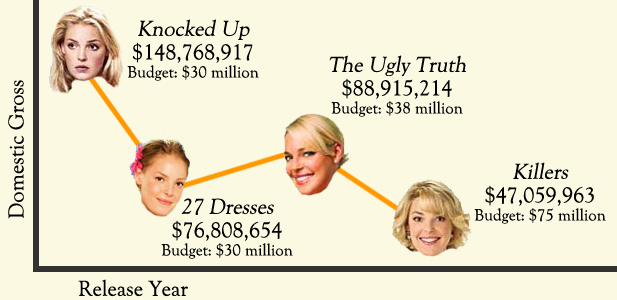Coming soon to a bad date near your is Katherine Heigl’s latest romantic comedy (and inherent tragedy) Life as We Know It. In it Heigl plays a beautiful woman who seems to have it all together – until she’s forced to raise the baby of her recently deceased best friend with a ball-cap wearing Josh Duhamel. Hilarity ensues, I bet. It must! Look at the poster: he looks like a big baby!
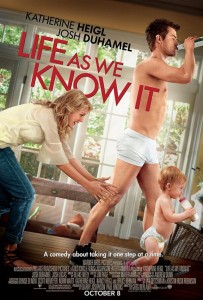 This poster nicely encapsulates what I loathe about Heigl and her career’s trajectory. Despite her big talk about portrayals of women in film, she returns again and again to gender stereotypes that are so formulaic they make me cringe.
This poster nicely encapsulates what I loathe about Heigl and her career’s trajectory. Despite her big talk about portrayals of women in film, she returns again and again to gender stereotypes that are so formulaic they make me cringe.
To catch you up: Heigl’s first breakthrough came from her role as Izzie on TV’s sex-soaked doctor drama Grey’s Anatomy. Then in 2007, after a number of movies you’ve never heard of (or didn’t realize she was in), Heigl scored a lead role in Knocked Up, Judd Apatow’s follow up to the smash hit The 40 Year Old Virgin. The stakes were high for Heigl but she pulled it off! Her portrayal of Alison, the knocked up party, was both funny and relatable. The film became a huge success and buzz abounded about this charming blonde who could hold her own among Hollywood’s new kings of comedy.
Personally, I loved Knocked Up. It not only made me laugh so hard my face hurt but also I empathized with Alison’s fear of her life changing.
The film follows Alison and Ben, an odd couple brought together by a pregnancy resulting from a drunken one-night stand. Of course, they are an unlikely match. Ben, a schlubby Seth Rogen, has no real job and lives in his own version of Never Never Land complete with giant bongs and lost boys. Alison, the vibrant and beautiful Heigl, has a cool job in television, but lives in her sister’s backyard in the pool house. Still, they both think they are living the dream. Then comes a wakeup call in the form of a positive pregnancy test. Now they both have to grow up and change.
Presented as a cautionary tale: Debbie and Pete, Alison’s sister and brother-in-law, who have a marriage on the brink of breakdown. They are each extremes of the issues Alison and Ben are struggling with. Debbie’s desire to provide a good life for her family has made her a control freak that henpecks her husband mercilessly – even in front of company. For his part, Pete rebels by partaking in a secret fantasy baseball league instead of talking to his wife about his desire to have some time to himself. This secrecy feeds Debbie’s fears and she becomes convinced he’s cheating on her. All this of course leads to a fight that Alison and Ben witness, and later repeat.
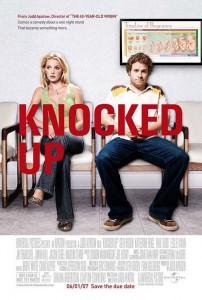 The stakes are clear. If Alison can’t learn to let go, she risks becoming the micromanaging malcontent her sister has become. Similarly, if Ben can’t learn to care about someone beyond himself, and take on the responsibility that kind of relationship entails, he’s doomed to become the simpering flake that Pete has devolved to. Both Alison and Ben need to change (grow up) to be responsible partners and parents, but relationships are hard. They involve a level of risk and trust that both characters are afraid to take on. I thought the film made that point beautifully.
The stakes are clear. If Alison can’t learn to let go, she risks becoming the micromanaging malcontent her sister has become. Similarly, if Ben can’t learn to care about someone beyond himself, and take on the responsibility that kind of relationship entails, he’s doomed to become the simpering flake that Pete has devolved to. Both Alison and Ben need to change (grow up) to be responsible partners and parents, but relationships are hard. They involve a level of risk and trust that both characters are afraid to take on. I thought the film made that point beautifully.
Cut to a six months later: Heigl was promoting her first big solo project, 27 Dresses. When asked about the film that made her a household name, she told Vanity Fair that Knocked Up is, “a little sexist. It paints the women as shrews, as humorless and uptight, and it paints the men as lovable, goofy, fun-loving guys. …Why is this how [Apatow is] portraying women?”
When I read this interview, I was stunned. Mostly because it’s a massively dumb move to publicly criticize the project that put you on the map. I mean, Heigl wasn’t just looking a gift horse in the mouth; she was punching it in the face! Eventually, shoving her high-heeled hoof in her mouth would kind of become Heigl’s trademark as rumors surfaced about her diva behavior on the Grey’s set. But I digress.
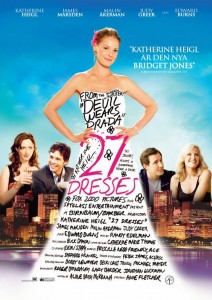 Basically, Heigl complained to a women’s magazine that her female character was a sexist stereotype of uptight womanhood. Now I’m often among the first to get riled by two-dimensional female characters that serve more as props for the male protagonists or a ploy to pull in a female audience than well-developed characters with any kind of autonomy or consequences on the plot – but I never had this issue with Knocked Up.
Basically, Heigl complained to a women’s magazine that her female character was a sexist stereotype of uptight womanhood. Now I’m often among the first to get riled by two-dimensional female characters that serve more as props for the male protagonists or a ploy to pull in a female audience than well-developed characters with any kind of autonomy or consequences on the plot – but I never had this issue with Knocked Up.
Still, maybe Heigl felt left out of the film’s funnier moments, and admitted it in a less than classy way during a long day of interviews. Everyone makes mistakes. And on the plus side, I took this outburst to mean she was going to strive to only take on films where women were well-written and don’t draw upon beleaguered sexual stereotypes. You know, like Sidney Poitier refused to play roles he felt would propagate a negative image of African-Americans. So my hopes were high. Then Heigl starred in a number of romantic comedies that contain far from flattering portrayals of women.
First was 27 Dresses, where she actually personified the cliché “always a bridesmaid never a bride,” while playing a passive-aggressive doormat of a women who doesn’t say boo when her sister starts blatantly hitting on her crush. So, of course she becomes the maid of honor for their nuptials – but along the way she finds love! But only after the required fashion montage where she tries on 27 bridesmaid dresses. You know, just like the title!
Then came The Ugly Truth with this poster:
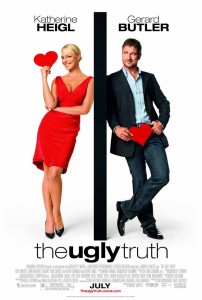 Get it? Because all women ever think about is love, and all men ever think about is sex! It was when this pandering picture was being promoted that Rogen and Apatow responded to Heigl‘s comments from 2007. Both scoffed that she criticized Knocked Up for supposedly sexist portrayals when she went on to make this. Apatow openly questioned if The Ugly Truth would be “uplifting for women.”
Get it? Because all women ever think about is love, and all men ever think about is sex! It was when this pandering picture was being promoted that Rogen and Apatow responded to Heigl‘s comments from 2007. Both scoffed that she criticized Knocked Up for supposedly sexist portrayals when she went on to make this. Apatow openly questioned if The Ugly Truth would be “uplifting for women.”
Yeah, it’s not.
Heigl plays Abby, a “psycho aggressive control-freak” who brings a checklist of what she wants from a man on blind dates and refers to it in front of said man. Her foil is an obnoxious and scruffy man (Gerard Butler) that she describes as an “uber moron misogynist.” Their meet-cute involves Abby shrewishly screeching at him on live TV, where he insists, “[Men] fall in love because of your tits and ass and we stick around because we like what you do with them.”
The flick is full of offensive macho tropes like this, including the tip to ladies to be “the saint and the sinner…the librarian and the stripper” – the Madonna and the whore. Finger snaps for feminism! Then there’s a scene where a young boy accidentally manipulates a pair of vibrating panties Abby mistakenly wears to a business dinner. I could go on but basically the film repeatedly promotes that women can only find love (including self-love) with the explicit help of a man. So as an audience we’re meant to cheer when the control freak and moron misogynist get together at the film’s end, despite the fact Butler’s character flat-out insists, “Men are incapable of growth, change, or progress.” How is this a happy ending?
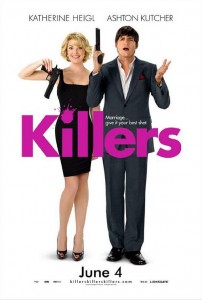 Then this summer came Killers with its depressing take on the Mr. and Mrs. Smith poster. Everything about this poster bothers me. First there’s the insipid title. Then there’s Heigl’s coquettish pose – like she’s about to drop a favor for her knight in shining armor. Women are far too fair and delicate to know how to hold a gun! Finally there’s the tag line: “Marriage…Give it your best shot.” Because marriage plus gunplay always equal good times!
Then this summer came Killers with its depressing take on the Mr. and Mrs. Smith poster. Everything about this poster bothers me. First there’s the insipid title. Then there’s Heigl’s coquettish pose – like she’s about to drop a favor for her knight in shining armor. Women are far too fair and delicate to know how to hold a gun! Finally there’s the tag line: “Marriage…Give it your best shot.” Because marriage plus gunplay always equal good times!
Like most of America, I did not see this movie.
Now, barely four months later, she’s back with Life as We Know It, with its gender stereotypes proclaimed proudly on its poster.
Sociological Images breaks it down:
“While Heigl is presented as a warm, caring motherly figure, her male costar is likened to a baby: immature and irresponsible, just another child in the family. He reflects the stereotype represented in so many romantic comedies and Monday night sitcoms alike that men are messy, careless, and juvenile.
They’re repeatedly presented as messy, careless, and juvenile…and yet still ultimately get the mature, caring, nurturing, attractive woman.
These stereotypes are offensive to women and men. Women are supposed to settle — to fall in love with the equivalent of a child, and to find that endearing, as opposed to insulting or creepy. That means, of course, she’ll have to be primarily responsible for childcare and running the household, since you can’t trust an immature, careless person to do important things.”
My thoughts exactly.
So in a nutshell, Katherine Heigl denounced her star-making movie as sexist for it’s supposedly stereotypical portrayals of women as shrews who ruin the good-natured high jinks of men. Whether she intended it or not, this statement implied a promise to her female audience that she would not take on roles that re-enforce sexist stereotypes in the future. Then she failed to take on anything but tired clichés and stilted stereotypes that make women out to be pathetic in or out of love. Her films go from dumb and clichéd to shockingly offensive and sexist, and she just keeps smiling and continuing on. Ultimately Heigl‘s propagated the kind of gross stereotypes that make women’s movies boring and insulting. And the audiences are starting to catch on.
Women are smarter than Heigl paints them with her broad strokes and flailing limbs. But to prove it, we have to stop patronizing these shoddy romances aimed at our demographic. If we as an audience stop supporting insipid rom-coms, then Hollywood will have to do better. And you know what? We deserve better. We deserve better than Katherine Heigl.
What’s a romantic comedy you enjoy that doesn’t invoke tired gender stereotypes?


